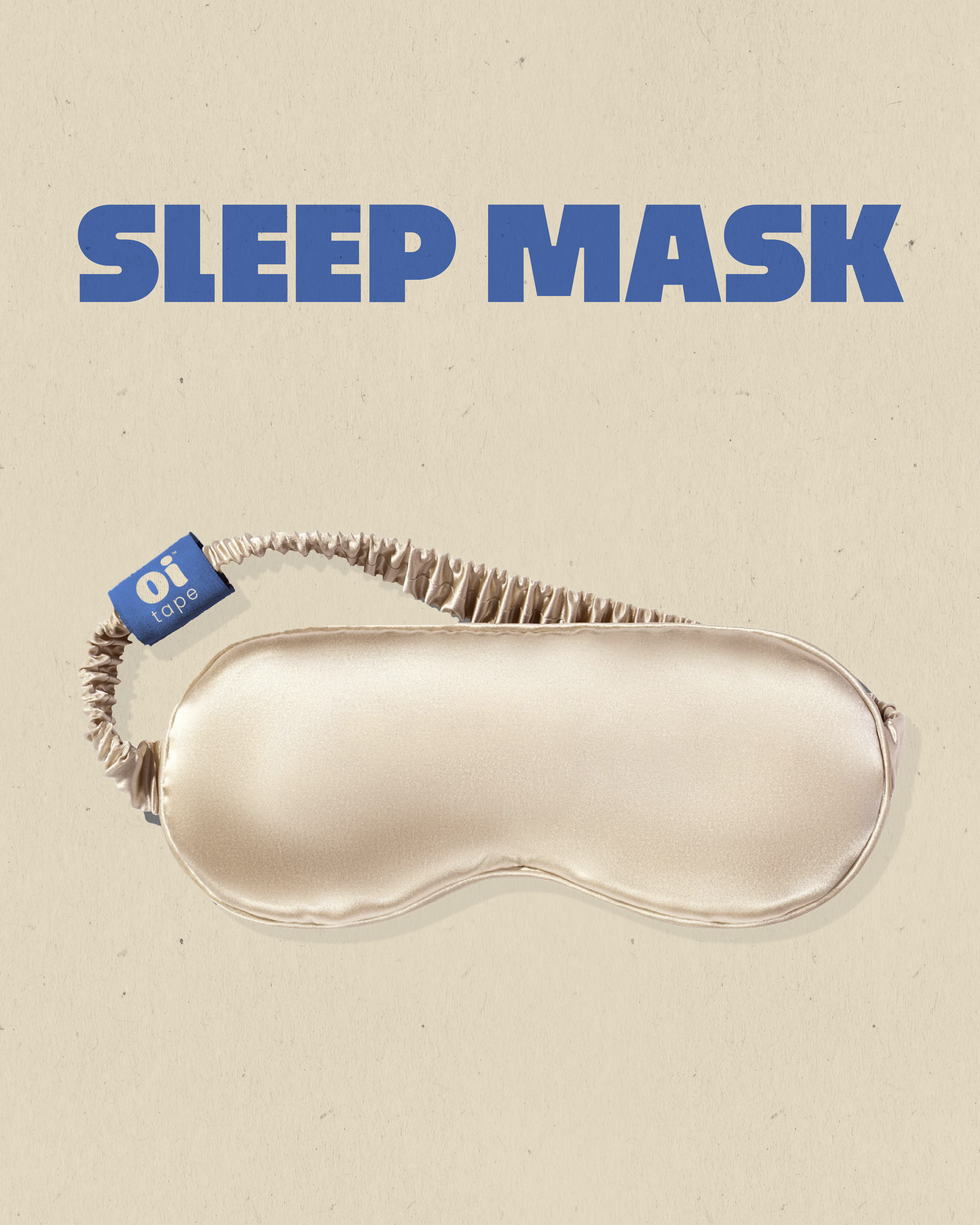

How to Treat Restless Sleep | oi tape™
Strategies to Treat Restless Sleep
Restless sleep can sap your energy, leaving you feeling unrefreshed and impacting your daily life and well-being. Understanding what causes restless sleep and the symptoms is the first step in tackling this common issue.
We believe everyone deserves a peaceful night’s rest. This guide explores effective strategies to treat restless sleep, including lifestyle changes, sleep environment adjustments, and relaxation techniques.
If you have trouble sleeping sometimes or often, our tips can help you sleep better and improve your nightly routine. Let’s delve into the essential steps to achieve the restful sleep you deserve.
What is Restless Sleep?
Restless sleep involves frequent awakenings, tossing and turning, and not being able to achieve deep, restorative rest. Despite spending enough hours in bed, individuals often feel fatigued and unrested. Restlessness during sleep can result from stress, anxiety, or discomfort during sleep.
It is important to tell restless sleep apart from insomnia. Insomnia is a more serious problem. This sleep disorder involves ongoing trouble falling asleep or staying asleep. This often needs medical help.
While insomnia can significantly impair daytime function, you can often address restless sleep with lifestyle changes and relaxation techniques. Understanding these nuances helps individuals seek appropriate strategies to treat restless sleep and improve sleep quality.
Quality sleep is vital for overall health, impacting cognitive function, emotional regulation, and physical health. Poor sleep quality can cause problems like a weaker immune system, more stress, and a higher risk of chronic diseases. These diseases include obesity and heart disease.
Understanding the importance of good sleep habits helps people use effective ways to improve restless sleep. This leads to better health and a happier life.
Related: 4 relaxation tools for your best nights sleep
Recognizing the Symptoms of Restless Sleep
Recognizing symptoms is the first step towards finding effective treatment strategies for restless sleep. Common signs include frequent awakenings, difficulty falling asleep, and persistent fatigue upon waking. You might also experience tossing and turning or an overall sense of restlessness when sleeping, leaving you feeling unrefreshed.
The effects of poor sleep can be profound. Physically, inadequate rest can lead to headaches, muscle tension, and weakened immunity. Emotionally, it can cause irritability, anxiety, and decreased concentration. This creates a cycle where poor sleep leads to emotional distress, exacerbating sleep difficulties.
Tracking sleep patterns is valuable for identifying disturbances. Keep a sleep diary to note bedtimes, how long it takes to fall asleep, and how often you wake up. Sleep tracking devices or smartphone apps can provide insights into sleep quality, including time spent in different sleep stages. Understanding your patterns helps you communicate with healthcare professionals and implement effective strategies to treat restless sleep.
Common Causes of Restless Sleep
Restless sleep can arise from lifestyle factors that affect nightly rest. Poor sleep hygiene, including irregular sleep schedules, excessive screen time, and an uncomfortable sleep environment, is a significant contributor. Caffeine and alcohol consumption close to bedtime can disrupt the sleep cycle, leading to restlessness during sleep. Physical discomfort from a non-supportive mattress or pillow can also prevent restful sleep.
Medical conditions can play a crucial role in restless sleep. Disorders like insomnia, sleep apnea, and restless legs syndrome are common. They cause frequent awakenings and make it hard to enter deeper sleep stages. Other issues, such as chronic pain or hormonal imbalances, may also interfere with restful sleep.
Stress and anxiety significantly impact sleep quality. Worries and stressors can create a cycle of restless nights and tired days. Anxiety can cause racing thoughts and heightened alertness, making it hard to relax and fall asleep.
Creating a calming bedtime routine can help you sleep better. Using stress-reduction techniques like meditation or deep breathing can also improve sleep quality. Creating a serene sleep environment with the right bedding and temperature further enhances the chances of peaceful sleep.
Related: Common toxins that disrupt your sleep
Effective Strategies for Improving Sleep Quality
Achieving restful sleep begins with a consistent sleep routine. Some sleep tips include going to bed and waking up at the same time every day helps your body’s internal clock. This makes it easier to fall asleep and wake up feeling refreshed.
Think about creating a calming pre-sleep routine. You could read a book or drink herbal tea. This helps your body know it’s time to relax. Prioritizing this routine enhances sleep quality and reduces restlessness when sleeping.
Environmental adjustments can also improve sleep quality. Create a sleep-friendly space that is dark, quiet, and cool.
Invest in blackout curtains to block light and use a white noise machine or earplugs to minimize sound disruptions. Consider the comfort of your mattress and pillows, as quality bedding is essential for restful sleep. Oi tape offers various options to help create the perfect sleep sanctuary tailored to your needs.
Healthy sleep includes relaxation techniques into your nightly routine can combat restless sleep. Deep breathing exercises, meditation, or gentle yoga can calm the mind and prepare the body for sleep. These practices reduce anxiety and promote a sense of well-being, essential for quality rest. Dedicating a few minutes each evening to these techniques may make it easier to drift into peaceful slumber.
Additionally, mouth taping from oitape.com is a natural remedy that can enhance breathing during sleep, potentially improving sleep quality. By ensuring nasal breathing, mouth taping can reduce snoring and increase oxygen intake, contributing to more restful nights.
When to Seek Professional Help
Knowing when to seek professional help for restless sleep is crucial for achieving restorative rest. If you have trouble falling asleep, wake up frequently, or feel tired after sleeping enough, talk to a professional. Symptoms like loud snoring, gasping for air, or persistent mood changes may indicate underlying disorders requiring medical attention.
During a sleep consultation, expect a comprehensive evaluation of your sleep patterns and health. The provider will discuss your sleep history, habits, lifestyle, and medications.
They may ask you to complete a sleep diary or questionnaires. In some cases, a sleep study may be suggested. This helps monitor sleep cycles and find issues like sleep apnea or restless leg syndrome.
Treatment options vary based on the causes of restless sleep. Common strategies include lifestyle modifications, such as improving sleep hygiene, establishing a consistent schedule, and creating a relaxing routine.
Cognitive-behavioral therapy for insomnia (CBT-I) may address negative thought patterns and behaviors contributing to sleep issues. For severe cases, doctors may prescribe medication to regulate sleep patterns. Seeking professional help can pave the way to more restful nights and improved well-being.
Additional Resources and Tips
Improving sleep often requires more than understanding strategies; it involves the right products and practices. Investing in a quality mattress tailored to your comfort is vital. Mattresses support different sleep styles, ensuring restful nights. Sleep aids, like weighted blankets or sound machines, can create a serene environment conducive to relaxation.
Sleep hygiene practices are crucial for better sleep. Establishing a consistent sleep schedule regulates your internal clock.
Creating a calming pre-sleep routine signals your body it’s time to wind down. Dim lights and engage in relaxing activities, like reading or meditating.
Limit screen time before bed. Blue light from devices can disrupt melatonin production. This makes it harder to fall asleep.
Numerous resources offer guidance on improving sleep. Websites dedicated to sleep health provide articles, tips, and expert advice on disorders and treatments.
Support groups and forums offer community for sharing experiences and recommendations. Connecting with others facing similar challenges can be reassuring and empowering. By utilizing these resources, you can enhance your knowledge and develop a comprehensive approach to treating restless sleep.
Share:





